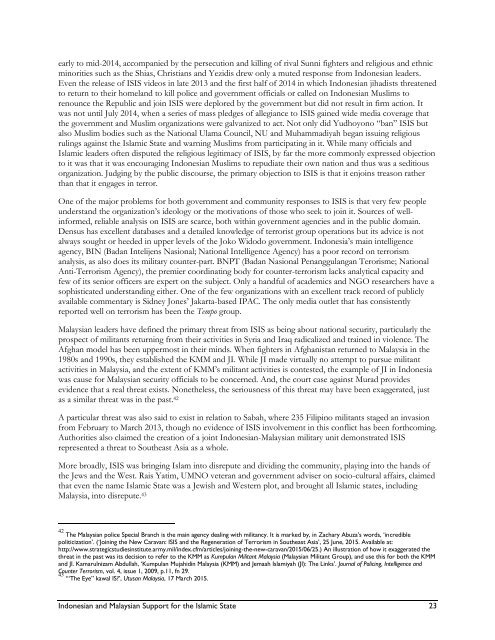INDONESIAN AND MALAYSIAN SUPPORT FOR THE ISLAMIC STATE (FINAL REPORT)
CVE_IndonesianMalaysianSupportforISIS
CVE_IndonesianMalaysianSupportforISIS
Create successful ePaper yourself
Turn your PDF publications into a flip-book with our unique Google optimized e-Paper software.
early to mid-2014, accompanied by the persecution and killing of rival Sunni fighters and religious and ethnic<br />
minorities such as the Shias, Christians and Yezidis drew only a muted response from Indonesian leaders.<br />
Even the release of ISIS videos in late 2013 and the first half of 2014 in which Indonesian jihadists threatened<br />
to return to their homeland to kill police and government officials or called on Indonesian Muslims to<br />
renounce the Republic and join ISIS were deplored by the government but did not result in firm action. It<br />
was not until July 2014, when a series of mass pledges of allegiance to ISIS gained wide media coverage that<br />
the government and Muslim organizations were galvanized to act. Not only did Yudhoyono “ban” ISIS but<br />
also Muslim bodies such as the National Ulama Council, NU and Muhammadiyah began issuing religious<br />
rulings against the Islamic State and warning Muslims from participating in it. While many officials and<br />
Islamic leaders often disputed the religious legitimacy of ISIS, by far the more commonly expressed objection<br />
to it was that it was encouraging Indonesian Muslims to repudiate their own nation and thus was a seditious<br />
organization. Judging by the public discourse, the primary objection to ISIS is that it enjoins treason rather<br />
than that it engages in terror.<br />
One of the major problems for both government and community responses to ISIS is that very few people<br />
understand the organization’s ideology or the motivations of those who seek to join it. Sources of wellinformed,<br />
reliable analysis on ISIS are scarce, both within government agencies and in the public domain.<br />
Densus has excellent databases and a detailed knowledge of terrorist group operations but its advice is not<br />
always sought or heeded in upper levels of the Joko Widodo government. Indonesia’s main intelligence<br />
agency, BIN (Badan Intelijens Nasional; National Intelligence Agency) has a poor record on terrorism<br />
analysis, as also does its military counter-part. BNPT (Badan Nasional Penanggulangan Terorisme; National<br />
Anti-Terrorism Agency), the premier coordinating body for counter-terrorism lacks analytical capacity and<br />
few of its senior officers are expert on the subject. Only a handful of academics and NGO researchers have a<br />
sophisticated understanding either. One of the few organizations with an excellent track record of publicly<br />
available commentary is Sidney Jones’ Jakarta-based IPAC. The only media outlet that has consistently<br />
reported well on terrorism has been the Tempo group.<br />
Malaysian leaders have defined the primary threat from ISIS as being about national security, particularly the<br />
prospect of militants returning from their activities in Syria and Iraq radicalized and trained in violence. The<br />
Afghan model has been uppermost in their minds. When fighters in Afghanistan returned to Malaysia in the<br />
1980s and 1990s, they established the KMM and JI. While JI made virtually no attempt to pursue militant<br />
activities in Malaysia, and the extent of KMM’s militant activities is contested, the example of JI in Indonesia<br />
was cause for Malaysian security officials to be concerned. And, the court case against Murad provides<br />
evidence that a real threat exists. Nonetheless, the seriousness of this threat may have been exaggerated, just<br />
as a similar threat was in the past. 42<br />
A particular threat was also said to exist in relation to Sabah, where 235 Filipino militants staged an invasion<br />
from February to March 2013, though no evidence of ISIS involvement in this conflict has been forthcoming.<br />
Authorities also claimed the creation of a joint Indonesian-Malaysian military unit demonstrated ISIS<br />
represented a threat to Southeast Asia as a whole.<br />
More broadly, ISIS was bringing Islam into disrepute and dividing the community, playing into the hands of<br />
the Jews and the West. Rais Yatim, UMNO veteran and government adviser on socio-cultural affairs, claimed<br />
that even the name Islamic State was a Jewish and Western plot, and brought all Islamic states, including<br />
Malaysia, into disrepute. 43<br />
42 The Malaysian police Special Branch is the main agency dealing with militancy. It is marked by, in Zachary Abuza’s words, ‘incredible<br />
politicization’. (‘Joining the New Caravan: ISIS and the Regeneration of Terrorism in Southeast Asia’, 25 June, 2015. Available at:<br />
http://www.strategicstudiesinstitute.army.mil/index.cfm/articles/joining-the-new-caravan/2015/06/25.) An illustration of how it exaggerated the<br />
threat in the past was its decision to refer to the KMM as Kumpulan Militant Malaysia (Malaysian Militant Group), and use this for both the KMM<br />
and JI. Kamarulnizam Abdullah, ‘Kumpulan Mujahidin Malaysia (KMM) and Jemaah Islamiyah (JI): The Links’. Journal of Policing, Intelligence and<br />
Counter Terrorism, vol. 4, issue 1, 2009, p.11, fn 29.<br />
43 ‘“The Eye” kawal IS?’, Utusan Malaysia, 17 March 2015.<br />
Indonesian and Malaysian Support for the Islamic State 23


